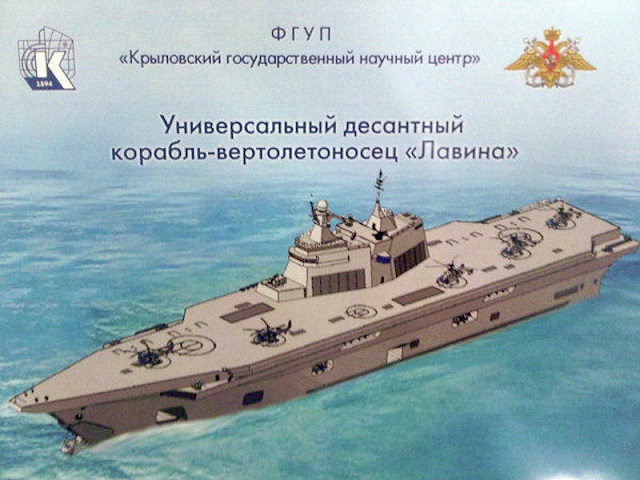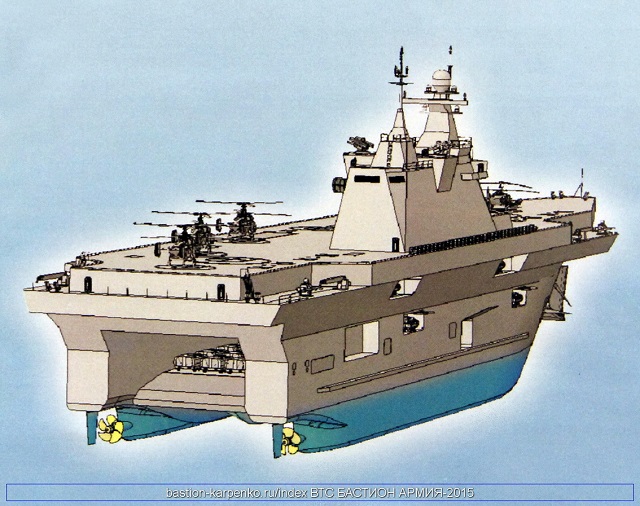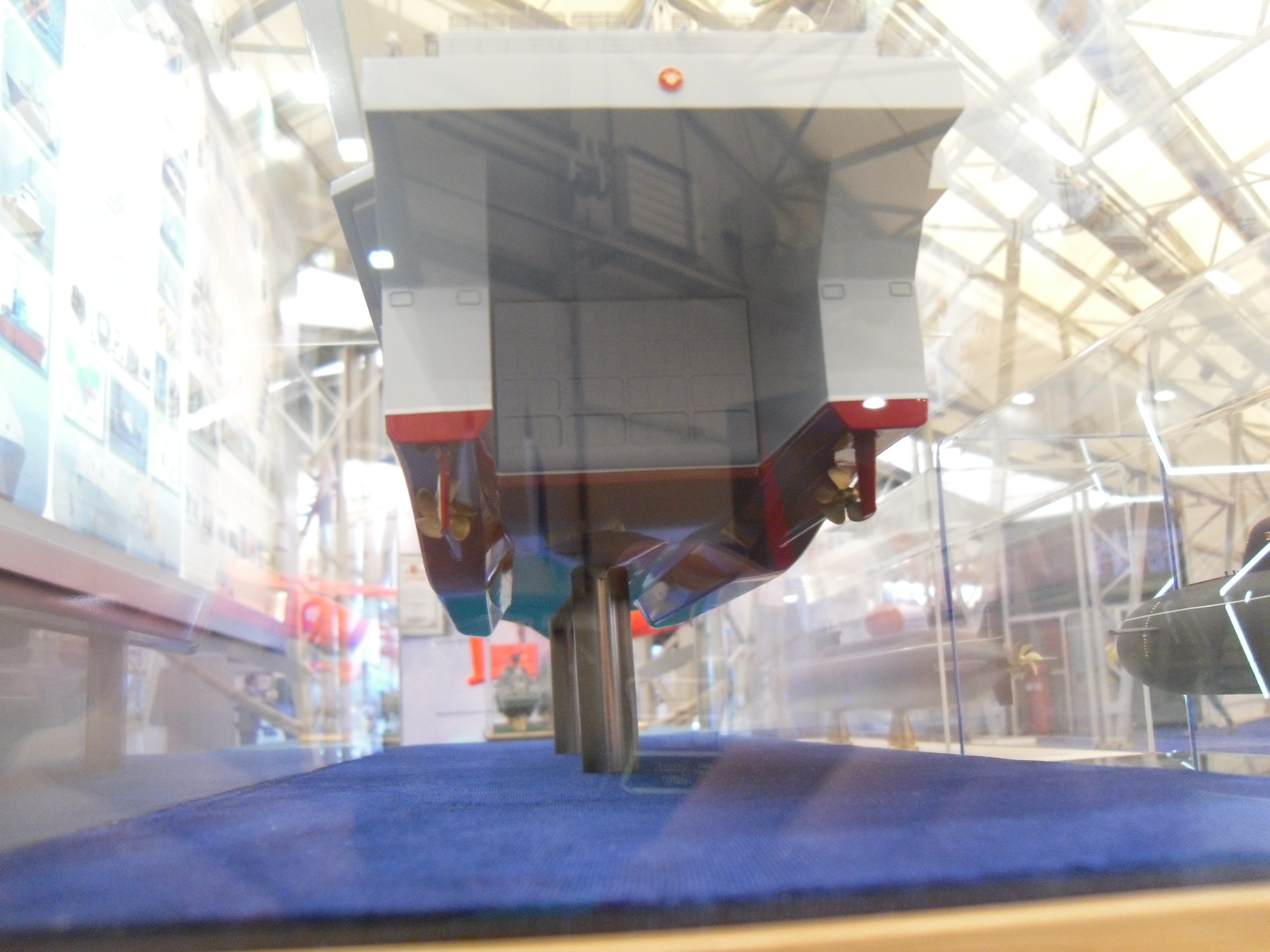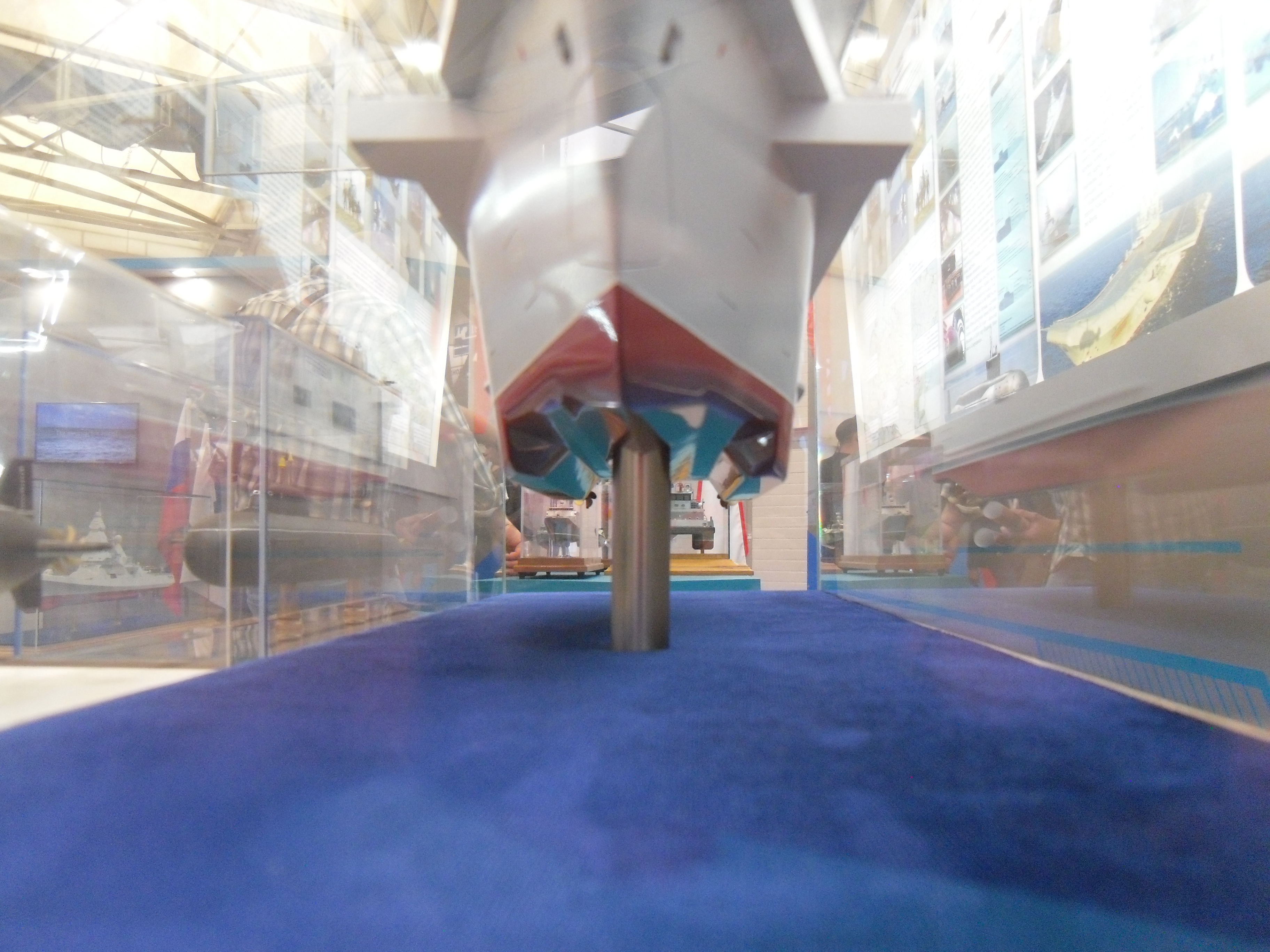The Russian Ministry of Defense informed that the first domestic general purpose landing ship will be built in 2022, while a new high-speed military helicopter will have to make its first flight by 2025. The performance requirements for the helicopter have already been determined, and now the project details are being specified in conjunction with the Russian Helicopters Company. As early as 1980, Chiefs of the General Staff, led by Deputy Chief of the Navy Admiral Nikolai Amelko, appealed to the country's leadership for the construction of domestic helicopter carriers, the online newspaper Gazeta.ru writes.

Priboy LHD scale model showcased by Krylov during Army 2016 exhibition
On May 25, 2017, Russia’s Deputy Defense Minister Yuri Borisov said at the HeliRussia 2017 helicopter industry exhibition that the first Russian helicopter carrier will be available by 2022. "The helicopter carrier construction cycle is at least four years, the ship will be completed by around 2022," he said.

Image showing Krylov Central Scientific Research Institute's Avalanche (Lavina) Project with the official seal of the Russian Navy.
Chiefs of the General Staff, led by Deputy Chief of the Navy Admiral Nikolai Amelko, appealed to the country's leadership for the construction of domestic helicopter carriers back in 1980. Light and relatively cheap anti-submarine helicopter carriers could be built according to simplified requirements on the basis of hulls and machinery of civilian vessels instead of heavy aircraft-carrying cruisers (HACC).

Priboi LHD scale model showcased by Krylov during Army 2016 exhibition.
This group of commanders managed to achieve the inclusion of the construction of two such ships at the Black Sea Shipyard in the military shipbuilding program for 1981-1990 directly after the HACC Baku and instead of the Project 1143.5 HACC.

The former Russian Navy Mistral class LHD Vladivostok
However, at the same time, the General Staff expanded the range of missions that helicopter carriers had to accomplish, which led to the need to revise the issued performance specifications. In the new version, amphibious helicopter carriers could no longer be built around civilian vessels and approached the HACC in cost. With the help of these arguments the Navy Command and the leadership of the Ministry of Shipbuilding Industry managed to convince the government of the inexpediency of building helicopter carriers.
The ceremony of handing over to Egypt the first of two Mistral class landing helicopter dock (LHD) ships, built for Russia at the French STX shipyard in Saint-Nazaire, was held a year ago, on June 2.
The history of the Mistral class LHD ships lasted for a total of five years since 2011 when Anatoly Serdyukov, then Russia’s Defense Minister, decided to order LHD ships of this class from the French shipyard. The contract for the construction of two ships for the Russian Navy was signed in June 2011 between French DCNS/STX and Russian special arms exporter Rosoboronexport. The value of the contract amounted to 1.2 billion euros. The helicopter carriers were to join the Pacific Fleet of the Russian Navy.
The Mistral class general purpose landing ship is able to develop a speed of more than 18 knots and has a cruising range of up to 20,000 miles. It has a length of 199 meters. Its draft at the displacement of 22,600 tons is 6.42 m. The crew of the ship consists of 177 people, plus it has the ability to carry 480 people on board. The air group includes 16 helicopters, six of which can be simultaneously located on the take-off deck.
Two Mistral class LHD ships - Vladivostok and Sevastopol - were built under the contract with Russia, and the handover of the first LHD Vladivostok was to be held in the fall of 2014, and the second, Sevastopol, in the fall of 2015. However, on November 25, 2014, the president of France decided to suspend the delivery of Russia’s ships for geopolitical reasons, because of the events in the southeast of Ukraine.

Image showing Krylov Central Scientific Research Institute's Avalanche (Lavina) Project
Russia’s Deputy Defense Minister Yuri Borisov then said that Russia would wait for the final decision of Paris and would not make any claims, but only act in strict accordance with the contract. For a long time, DCNS claimed that the US and the policy of sanctions against Russia would not interfere with the construction and handover of the Mistrals.
The contract was not terminated until nine months later - in August 2015 Moscow and Paris officially declared: the Mistral theme was closed. The Kremlin press service reported on August 5: "The President of the Russian Federation and the President of the French Republic made a joint decision to terminate the contract for the construction and delivery of two Mistral class landing helicopter dock ships, signed in June 2011."
As a result of the agreement, Russia should fully receive reimbursement of the amounts paid in advance under the contract. Termination payments on the contract amounted to about 950 million euros. As explained in the Ministry of Industry and Trade and Rosoboronexport, it turned out that Russia received almost twice more than paid in advance for the ships in ruble equivalent due to devaluation of the ruble.
Russia had to approve the resale of the Mistrals by France to a third party. Before the handover to the new owners, it was necessary to remove all Russian equipment from the ships, in particular the communication system, the online newspaper Gazeta.ru recalls.
Navy Recognition Comment
Russian Krylov State Research Center has developed the Priboy LHD on its own initiative. It is significantly different from the Mistral landing helicopter dock designed by French DCNS. Priboy is intended for seaborne movement of troops and military equipment and landing on beaches during amphibious operation in conjunction with other naval forces. It can support projection of soldiers and hardware, take part in offensive mining actions and mount sonar beacons of suspended array surveillance systems.
Priboy has a normal surface displacement of 23,000 t, a length of 200 m, a width of 34 m, a designed draft of 7.5 m, a full speed of 20 kn, a cruise speed of 14 kn, an endurance of 6,000 nmi or 30 days. The LHD can withstand storms of force 6-7 on the Beaufort scale (strong breeze/near gale). The ship has a crew of 400 sailors and can transport 500-900 soldiers, about 50 infantry fighting vehicles (IFV) and 10 main battle tanks (MBT).
Up to 12 military-transport and search-and-rescue (SOR) helicopters can be based on Priboy. The ship incorporates six fast landing craft with 45 t lifting capacity each and six assault boats located on davits.
Polyakov pointed out that Priboy is equipped with tactical-level integrated combat management system. The LHD features electronic warfare (EW) and hydroacoustic hardware that includes three-axis detection radar, navigation system, integrated EW and communication suites and underwater sabotage forces detection system.
The Priboy`s armament suite includes two anti-air gun-missile combat modules, two close-in weapon systems and one 76mm naval gun.
Source:










